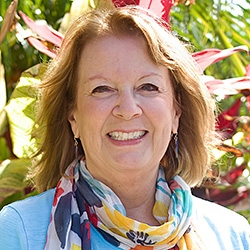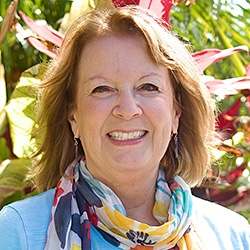
Search Results: response
-
Ask the Trainer: "What guidance do you have for working with enemy images? Can you say some things about processes and/or exercises that can bring relief from this trap?"
-
- Tune into your self-dialogue with a compassion that supports loving presence
- Shift limiting beliefs about your parenting patterns so you can choose consciously
- Transform frustration, confusion, or guilt into constructive, honest discussions
- Foster your ability to say yes and no in a way that supports your natural limits
-
Join veteran Mediators and Facilitators, Jori and Jim Manske in using Nonviolent Communication and mediation skills for transforming conflict into connection between yourself and others.
-
Trainer Tip: Sometimes the people in our lives don’t yet have the skills to speak directly about what they want. When this happens we can make guesses about how they feel and what they want. This can lead to greater connection and chances we all can be more satisfied with our interactions.
-
Much like other asymmetric relationships (such as therapist and client), there are complications related to power dynamics that can arise with any NVC trainer having sex with a participant. For one, there's (counter)transference. And there's potential for things that may not move outside this asymmetric relationship -- such as projections where the participant, and/or the trainer, is guided by un-healed pain of their "inner child".
-
- Discover how mediation is a fundamental social skill that everyone can learn
- Gain the skills to stay centered when a conflict becomes heated
- Learn how to lead a dialogue toward sustainable agreements
- Help facilitate connection and creativity to discover and meet everyone’s needs
-
CNVC Certified Trainer, Yoram Mosenzon has a vision… he sees mediation as a basic life skill that could be taught in schools starting at the age of three. He dreams of a world where all human beings have mediation skills to support understanding, cooperation, and connection when conflicts arise.
-
Join Linda Mia Mukte (formerly Rysenbry), CNVC Certified Trainer, for this uniquely powerful telecourse recording that blends NVC with Dr. Sue Johnson’s empirically validated work on adult love relationships called EFCT: Emotionally Focused Couples Therapy.
-
Learn to speak NVC using your own voice and increase ease and flow in all your personal and professional conversations. This 7-session telecourse recording with renowned trainer Miki Kashtan is designed to help you integrate NVC into all aspects of your life by gaining fluency in your practice of NVC and by embodying the principles regardless of the words you use. This course is based on intensive practice and coaching with real-life examples from participants’ lives.
-
Is there someone you wish was more willing? Try guessing what obstacles they might be struggling with. And allow yourself to feel your grief. As you grapple with your own desire for someone to find their willingness, its essential to recognize that this is about you and your needs. You can also express your needs honestly, make requests for how to collaborate, and be responsive to what they want. Read on for more on this, plus four common ways someone’s willingness might be blocked.
-
This 31-minute audio with Miki Kashtan is packed full of power as she uncovers the dynamics of choice that are present 100% of the time, in every situation, regardless of the circumstances.
-
As parents, we often face challenging situations on a daily basis and struggle to create what we most long for. In this 6 session telecourse recording, you will learn how Nonviolent Communication can support a family culture where cooperation, trust, and peace are nurtured, and children and parents can flourish together.
-
Some of my core beliefs make experiencing gratitude difficult . For example, it’s difficult to celebrate others or myself when I think I have to prove my worth in order to be accepted. So much energy goes into proving myself, there’s little left for celebration.
-
- Learn how to transform NVC into a tool for systemic awareness and healing
- Examine the influence of difference, and uncover pathways that strengthen its capacity
- Learn to receive and offer feedback on impact in situations fraught with power differences
- Explore specific ways in which NVC systemically supports the full flowering of humanity
- Delve into the dynamics of cultural differences, and discover how NVC can systemically contribute to a liberation perspective
-
If you’ve ever dreaded attending a meeting – or watched in dismay as your group collapses into conflict – know that a methodology known as Convergent Facilitation offers you possible solutions. It’s based on one simple experience: that people come together at the level of their underlying principles, needs, aspirations, and dreams, not at the level of their surface positions.
Convergent Facilitation is a highly efficient decision-making process developed by Miki Kashtan from the principles of Nonviolent Communication. It enables you to look beneath the surface and find the essence of what’s important to different stakeholders, and bring it together into one set of principles that lead to proposals and ultimately decisions. As a result, it readily produces solutions and decisions that everyone can embrace.
-
Trainer Tip: When they say "no", acknowledge what people are saying "yes" to. From there, you persist towards a resolution that values both party's needs, without demand. Persisting is when we try to meet needs by continuing to connect with another. Demanding is when we insist someone do something, or else face negative repercussions. Showing care and willingness to work with people can help them to want to collaborate and resolve conflict.
-
Are we really safer when we put those who harm others behind bars and forget about them? Explore turning our prisons into houses of healing and creating connections that lead to greater safety for our communities.
-
Listen in as Dian shares her tips and sense of urgency around bringing NVC skills to work: 1) How to use your imagination (visualization!) to help you connect with somatic responses and needs; and 2) Five built-in advantages to sharing NVC in the work place.
-
Most people want to punish perpetrators of sexual violence. Unfortunately, punishment doesn’t lead to lasting widespread change. Rather, we can identify root causes and conditions that sustain violence. That means shifting from individual to systemic lenses, and from punitive to restorative responses. It means collective learning about how such acts are nurtured and persist. This can reduce the chance of it happening again.
-



















